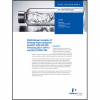Researchers at the University of Alicante Faculty of Science Analytical Atomic Spectrometry Group, Spain, in collaboration with the University of Pau et des Pays de L’Adour, France, have developed an analytical method capable of improving the diagnosis and monitoring of oncological diseases from a blood serum sample. Using size exclusion chromatography-inductively coupled plasma mass spectrometry (SEC/ICP-MS), the procedure detects several biomarkers simultaneously.
“Most of the oncological markers lack sufficient sensitivity and specificity, thus limiting their clinical usefulness. However, an analysis that includes different biomarkers whose concentration could be affected by the type of cancer that is suspected, increases diagnostic accuracy”, explained Emma Pérez from the University of Alicante.
An advantage of the method lies in its sensitivity. The researchers from Alicante analysed blood serum, some of which is incubated with a mixture of antibodies labelled with lanthanide polymers. The resulting immunocomplex is separated from the remaining antibody by SEC, and the concentration of tumour markers is determined by ICP-MS from the signal of the lanthanides.
The study is part of the doctoral thesis project recently defended by Emma Pérez, which, other than being an advance in early detection and follow-up of oncological patients, also opens doors to other novel analytical methodologies based on the use of immunoassays and ICP-MS. In the food industry, for example, it could be applied to the detection of toxins at concentration levels well below those allowed by the European Union. In fact, the method could reduce the permitted levels of contamination in milk by aflatoxin M1 (AFM1) up to ten times. AFM1 represents a serious danger to consumer’s health due to its carcinogenic, teratogenic and mutagenic activity, with the capacity to affect organs such as the liver, kidney or brain.
The work is reported in Analytica Chimica Acta (doi: 10.1016/j.aca.2018.02.056).








